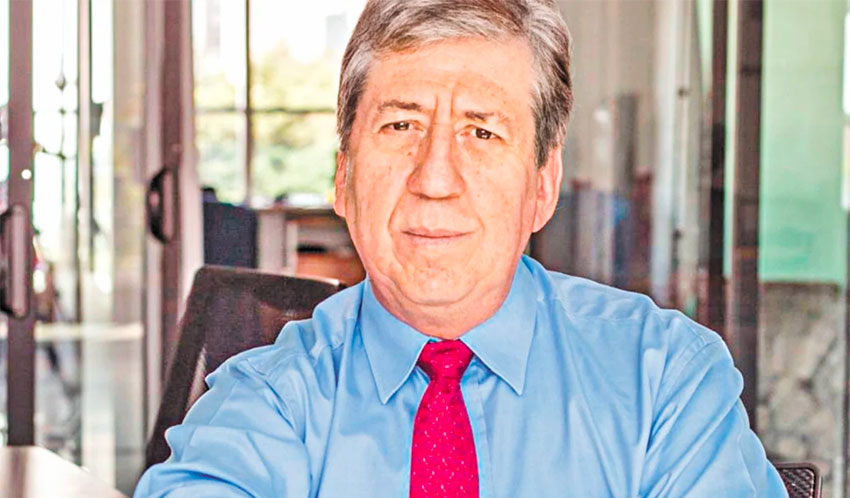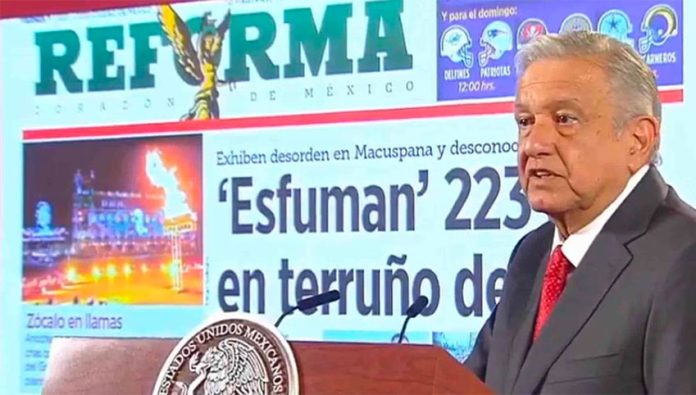The general director of a news website and the Americas director of the non-governmental organization Human Rights Watch (HRW) have criticized President López Obrador for attacking journalists and publications that are unfavorable to him and his government.
Roberto Rock Lechón of the news portal La Silla Rota and president of the Committee on Freedom of the Press and Information at the Inter American Press Association (IAPA), said López Obrador and his government collaborators create a “poisoned atmosphere” with their attacks on the media.
The attacks risk inciting violence against journalists, he said, a warning already made by the press freedom organization Article 19.
José Miguel Vivanco, executive director of the Americas division at HRW, said the president’s attitude toward the media reveals “strong authoritarian tendencies” and an expectation that it will applaud the decisions he and his government take.
In an interview with the newspaper El Universal, Rock asserted that the attitudes of AMLO, as the president is best known, and his team toward the media amount to a “scheme of pressure and harassment” of journalists.

López Obrador frequently lashes out at media outlets for publishing reports and opinion pieces with which he doesn’t agree or which portray him and/or his government in a negative light. The Mexico City-based broadsheet Reforma is a favorite target of the president, who describes it as a “conservative” newspaper and part of the “elitist press.”
Rock said that AMLO’s “pattern of political positions” toward the media is similar to the attitudes adopted by presidents and governments in countries such as the United States, Venezuela, Cuba, Nicaragua, El Salvador and Argentina.
“The president’s stance must be interpreted as intolerance of the essential work of the press” and its mission to inform the public with responsibility, independence and pluralism, he said.
Rock said the government’s decision to sanction the news magazine Nexos, ostensibly for submitting false documentation to obtain advertising, amounted to “intimidation or prior censorship” and set a “terrible precedent” for press freedom in Mexico.
He said López Obrador’s frequent attacks – the president has also taken aim at international publications such as The Financial Times – have caused members of the IAPA, an umbrella group of about 1,300 media organizations, to ask “what is happening in Mexico?”
The Mexican media helped to destroy authoritarianism over the past 50 years, foster a more plural dialogue and promote institutions tasked with ensuring transparency and accountability in all aspects of the nation’s democracy, Rock asserted.
Its work strengthened opposition parties, encouraged the expression of dissident voices and citizens’ participation in politics and established tolerance as a fundamental value of society, he charged, adding that the media helped politicians with parties opposed to the Institutional Revolutionary Party (PRI) – which was in office in Mexico for most of the 20th century – to win important positions of power.
Thus López Obrador – who left the PRI in the late 1980s to join the Democratic Revolution Party before creating his own party, Morena, in 2014 – benefited from the work of a freer media, Rock said.
“López Obrador was able to arrive at the presidency of the republic thanks to this new atmosphere of citizens’ participation, the plurality of political actors and the opening up of the media. It’s ironic, a paradox, that with this history we’re faced with a government that seeks to discredit, insult and hurl questions at the media on a daily basis,” he said.
In a separate interview with El Universal, Vivanco also criticized the decision to fine Nexos and ban federal agencies from advertising in the magazine for two years. He said that Mexico is just as dangerous for media workers as Afghanistan and noted that 23 journalists have been killed since López Obrador took office in December 2018.
The president’s “stigmatizing and disqualifying” discourse towards journalists and the media in general constitutes a “serious problem,” Vivanco said in response to a question about whether López Obrador’s remarks pose a threat to freedom of expression.
AMLO and other government officials undermine the role journalism plays in a democratic society and pose a threat to freedom of speech, he said.

The president’s tendency to hurl insults at the media and attack journalists at his regular news conferences belies a “democratic attitude,” Vivanco added.
“On the contrary, everything indicates … that the the president has strong authoritarian tendencies and that he would prefer to live in a society in which the media … applauds what he does,” he said.
Asked about the consequences of the attacks on the press, Vivanco responded:
“There is an attempt to discredit the media [but] I don’t believe López Obrador has succeeded so far. In the face of this persistent and aggressive campaign … Mexico has shown that it has spaces and strengths that allow the official discourse to be countered in both traditional media and new media.”
The HRW director accused the president of espousing conspiracy theories which he doesn’t back up even with the bare minimum of evidence.
“My fundamental criticism of the head of state … is the lack of arguments,” he said.
Asked why attacks on the media and attempts to discredit news organizations appear to be a regional phenomena, Vivanco said:
“Leaders have emerged that make demagogy a way of life. Donald Trump lies systematically all day every day and so does [Jair] Bolsonoro in Brazil, another populist leader. … All these leaders, Trump as well as López Obrador and Bolsonaro, operate on the basis of a core value: vanity [and] their ego.”
The criticism leveled at López Obrador by Rock and Vivanco comes three weeks after the Mexico representative of the Committee to Protect Journalists also took aim at the president.
“The political climate in Mexico doesn’t encourage freedom of expression. When the government of Andrés Manuel López Obrador took office we saw some positive signs; for example, the commitment to put an end to impunity, censorship and the murder of journalists. Unfortunately, almost two years later there is a climate of significant polarization, … a rhetoric of confrontation with the press [and] a division between good press and bad press,” said Jan-Albert Hootsen.
Source: El Universal (sp)
